 FILM
FILM « In Which We Examine The Base From Which He Took Flight »
 Thursday, December 14, 2017 at 8:00AM
Thursday, December 14, 2017 at 8:00AM 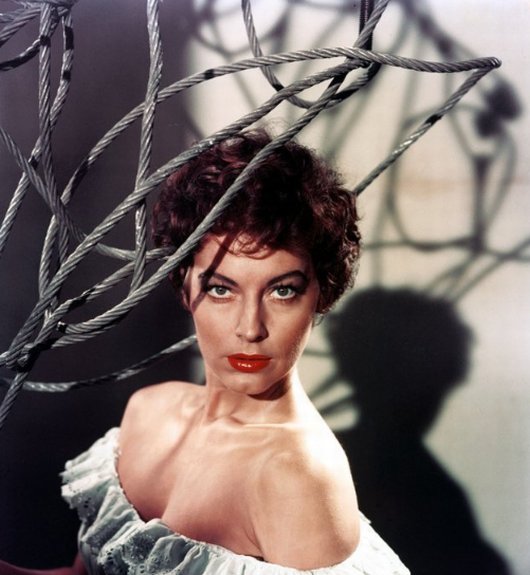
Do They Stare Back?
Shallowness that asks to be taken seriously is an embarrassment.
Reading the reviews of Pauline Kael is rewarding because of her descriptions of actresses and actors. Beyond taking them to task for their mere talent, she was able to describe the effect they had on people through their continuing cinematic presence. Kael properly deduced that a huge part of going to the movies consisted of how the audience responded to the people on the screen, rather than simply basing her critique on the competence of the writing or the technical aspects of the cinematography. Her sentences in her radio and print reviews about the onscreen talent of the twentieth century rise to the level of expert observation of humanity in all its manifold variety.
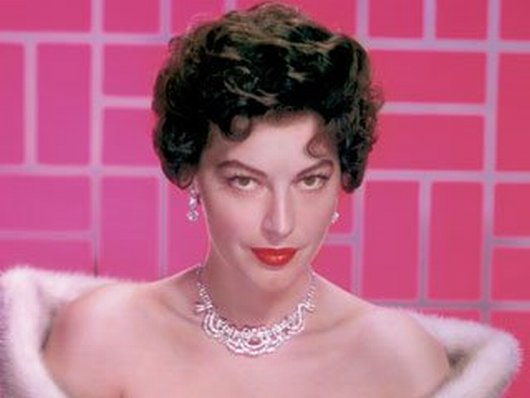
Ava Gardner
Gardner was one of the last of the women stars to make it on beauty alone. She never looked really happy in her movies; she wasn't quite there, but she never suggested that she was anywhere else, either. She had a dreamy, hurt quality, a generously modeled mouth, and faraway eyes. Maybe what turned people on was that her sensuality was developed but her personality wasn't. She was a rootless, beautiful stray, somehow incomplete but never ordinary, and just about impossible to dislike, since she was utterly without affectation. But to Universal she is just one more old star to beef up a picture's star power, and so she's cast as a tiresome bitch whose husband is fed up with her.
She looks blowzy and beat-out, and that could be fun if she were allowed to be blowzily good-natured, but the script here harks back to those old movies in which a husband was justified in leaving his wife only is she was a jealous schemer who made his life hell. Ava Gardner might make a man's life hell out of indolence and spiritual absenteeism, but out of shrill stupidity?
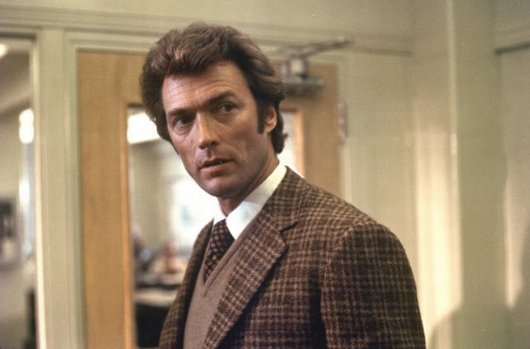
Clint Eastwood
Clint Eastwood isn't offensive; he isn't an actor, so one could hardly call him a bad actor. He'd have to do something before we could consider him bad at it. Acting might get in the way of what the movie is about — what a big man and a big gun can do. Eastwood's wooden impassivity makes it possible for the brutality in his pictures to be ordinary, a matter of routine. he may try to save a buddy from getting killed, but when the buddy gets hit no time is wasted on grief; Eastwood couldn't express grief any more than he could express tenderness. With a Clint Eastwood, the action film can — indeed, must — drop the pretense that human life has any value. At the same time, Eastwood's lack of reaction makes the whole show of killing seem so unreal that the viewer takes it on a different level from a movie in which the hero responds to suffering.
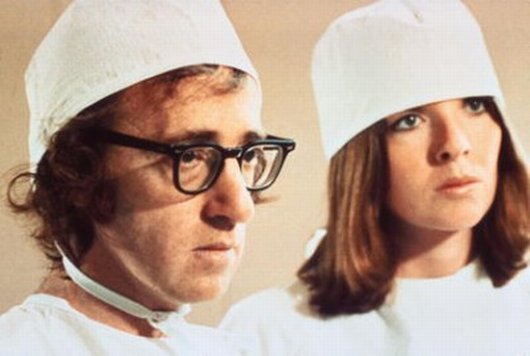
Woody Allen
Allen appears before us as the battered adolescent, scarred forever, a little too nice and much too threatened to allow himself to be aggressive. He has the city-wise effrontery of a shrimp who began by using language to protect himself and then discovered that language has a life of its own. the running way between the tame and surreal — between Woody Allen the frightened nice guy trying to keep the peace and Woody Allen the wiseacre whose subversive fantasies keep jumping out of his mouth — has been the source of the comedy in his films. Messy, tasteless, and crazily uneven (as the best talking comedies have often been) the last two pictures he directed — Bananas and Everything You Always Wanted to Know About Sex — had wild highs that suggested an erratic comic genius. The tension between his insecurity and his wit make us empathize with him; we, too, are scared to show how smart we feel.
And he has found a nonaggressive way of dealing with urban pressures. He stays nice; he's not insulting, like most New York comedians, and he delivers his zingers without turning into a cynic. We enjoy his show of defenselessness, and even the I don't-mean-any-harm ploy, because we see the essential sanity in him. We respect that sanity — it's the base from which he takes flight. At his top, in parts of Bananas and Sex, the inexplicably funny took over; it might be grotesque, it almost always had the flippant, corny bawdiness of a frustrated sophomore running amok, but it seemed to burst out — as the most inspired comedy does — as if we had all been repressing it. We laughed as if he had let out what we couldn't hold in any longer.
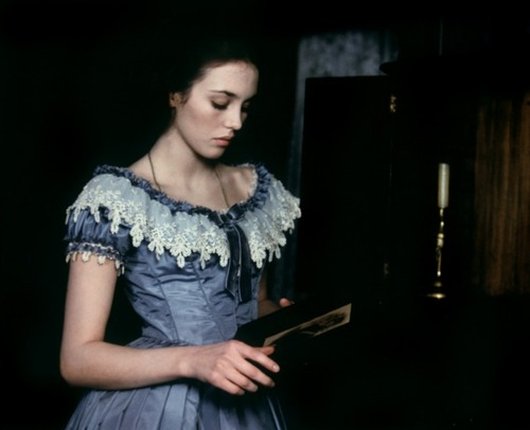
Isabelle Adjani
Only nineteen when the film was shot, Isabelle Adjani is much younger than the woman's she's playing. She hardly seems to be doing anything, yet you can't take your eyes off her. You can perceive why Truffaut has said that he wouldn't have amde this "musical composition for one instrument" without Isabelle Adjani. She has a quality similar to Jean-Pierre Leaud's in The 400 Blows — not a physical resemblance but a similar psychological quality. The awareness and intelligence are there, but nothing else is definite yet; the inner life has not yet taken outer form, and so in the movie you see the downy opacity of a face in process, a character taking shape. We keep staring at Adele to see what the face means.
Isabelle Adjani has been a professional actress since she was fourteen without tightening; one French directors says that she's James Dean come back as a girl. Considering how young she is, her performance here is scarily smart. She knows how to alert us to what Adele conceals; she's unnaturally quiet and passive, her blue eyes shining too bright in a pale flower face. Truffaut had the instinct not to age her with makeup in the course of the film; we can see that years are passing, but the tokens of time are no more than reddened eyes, a pair of glasses, tangled hair, a torn, bedraggled gown.
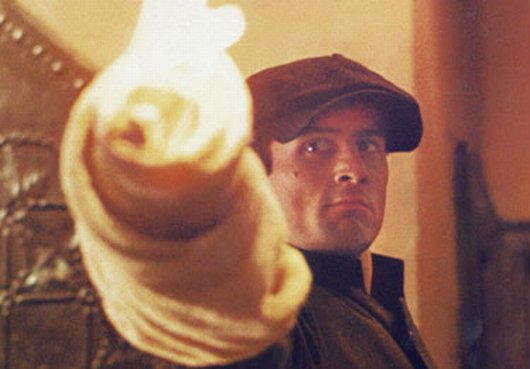
Robert De Niro
De Niro amply convinces one that he has it in him to become the old man that Brando was. It's not that he looks exactly like Brando but that he has Brando's wary soul, and so we can easily imagine the body changing with the years. It is much like seeing a photograph of one's own dead father when he was a strapping young man; the burning spirit we see in his face spooks us, because of our knowledge of what he was at the end.
In De Niro's case, the young man's face is fired by a secret pride. His gesture as he refuses the gift of a box of groceries is beautifully expressive and has the added wonder of suggesting Brando, and not from the outside but from the inside. Even the soft, cracked Brando-like voice seems to come from the inside. When De Niro closes his eyes to blot out something insupportable, the reflex is like a presentiment of the old man's reflexes. There is such a continuity of soul between the child on the ship, De Niro's slight, ironic smile as a cowardly landlord tries to appease him, and Brando, the old man who died happy in the sun, that although Vito is a subsidiary character in terms of actual time on the screen, this second film, like the first, is imbued with his presence.
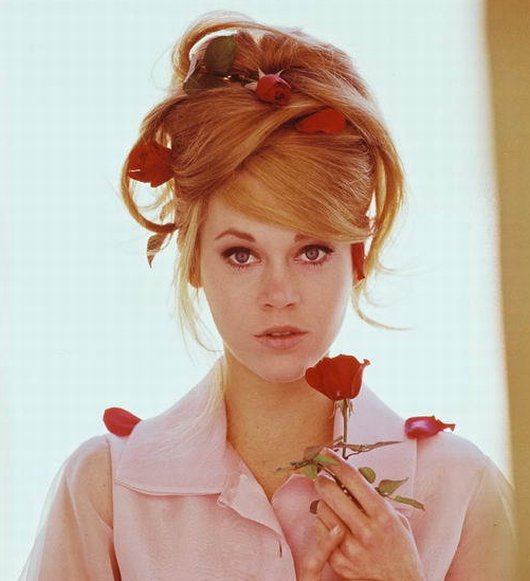
Jane Fonda
Jane Fonda having sex on the wilted feathers and rough, scroungy furs of Barbarella is more charming and fresh and bouncy than ever — the American girl triumphing by her innocence over a lewd comic-strip world of the future. She's the only comedienne I can think of who is sexiest when she is funniest. (Shirley MacLaine is a sweet and sexy funny girl, but she has never quite combined her gifts as Jane Fonda does.) Jane Fonda is accomplished at a distinctive kind of double take: she registers comic disbelief that such naughty things can be happening to her, and then her disbelief changes into an even more comic delight.
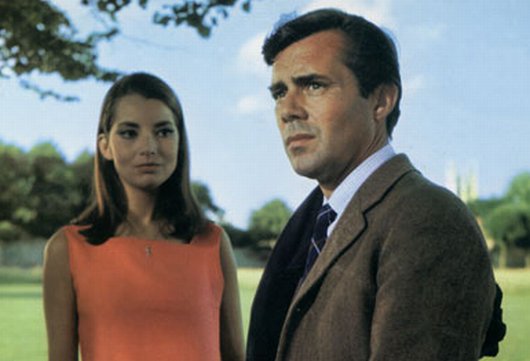
Dirk Bogarde
As the philosophy-don husband, Dirk Bogarde is just about perfect: he acts like a man who's had a spinal tap. He's a virtuoso at this civilized, stifled anguish racket, better even than Ralph Richardson used to be at suppressed emotion because he's so much more ambiguous that we can't even be sure what he's suppressing. He aches all the time all over, like an all-purpose sufferer for a television commercial — locked in, with a claustrophobia of his own body and sensibility.
Bogarde looks rather marvelous going through his middle-aged frustration routines, gripping his jaw to stop a stutter or folding in his arms to keep his hands out of trouble. The Ralph Richardson civilized sufferer was trying to spare others pain, but Bogarde isn't noble: he goes through the decent motions because of training and because of an image of himself, but he's exquisitely guilty in thought — a mouse with the soul of a rat. He compulsively tells little half lies that he attempts to make true and hesitates before each bit of truth he calculatingly parts with.
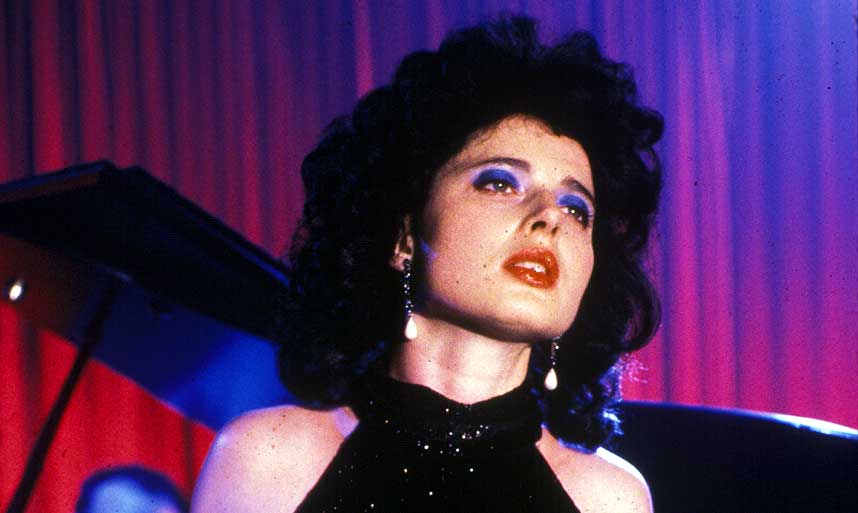
Isabella Rossellini
Rossellini doesn't show anything like the acting technique that her mother, Ingrid Bergman, had, but she's willing to try things, and she doesn't hold back. Dorothy is a dream of a freak. Walking around her depressing apartment in her black bra and panties, with blue eyeshadow and red high heels, she's a woman in distress right out of the pulps; she has plushy, tempestuous look of heroines who are described as "bewitching." (She has the kind of nostrils that cover artists can represent accurately with two dots.)
Rossellini's accent is useful: it's part of Dorothy's strangeness. And Rossellini's echoes of her mother's low voice help to place this kitschy seductress in an unreal world. She has a special physical quality, too. There's nothing of the modern American woman about her. When she's naked, she's not protected, like the stars who are pummelled into shape and lighted to show their muscular perfection. She's defenselessly, tactilely naked, like the nudes the Expressionists painted.
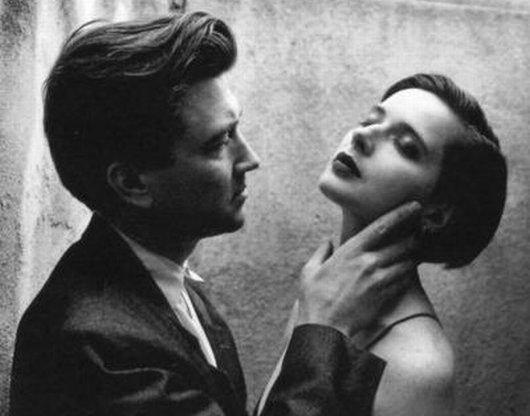
Once, in Berkeley, after a lecture by LeRoi Jones, as the audience got up to leave, I asked an elderly white couple next to me how they could applaud when Jones said that all whites should be killed. And the little gray-haired woman replied, "But that was just a metaphor. He's a wonderful speaker."
Her mixture of wide-eyed wonder and cuddly drugged sexiness seemed to get to just about every male; she turned on even homosexual men. And women couldn't take her seriously enough to be indignant; she was funny and impulsive in a way that made people feel protective. She was a little knocked out; her face looked as if, when nobody was paying attention to her, it would go utterly slack — as if she died between wolf calls.
She seemed to have become a camp siren out of confusion and ineptitude; her comedy was self-satire, and apologetic — conscious parody that had begun unconsciously. She was not the first sex goddess with a trace of somnabulism; Garbo was often a litte out-of-it, Dietrich was numb most of time, and Hedy Lamarr was fairly zonked. But they were exotic and had accents, so maybe audiences didn't wonder why they were in a daze; Monroe's slow reaction time made her seem daffy, and she tricked it up into a comedy style. The mystique of Monroe — which accounts for the book Marilyn — is that she became spiritual as she fell apart. But as an actress she had no way of expressing what was deeper in her except in moodiness and weakness. When she was "sensitive" she was drab.

Paul Newman
Somehow it all reminds one of the old apocryphal story conference — "It's a modern western, see, with this hell-raising, pleasure-loving man who doesn't respect any of the virtues, and, at the end, we'll fool them, he doesn't get the girl and he doesn't change!"
"But who'll want to see that?"
"Oh, that's all fixed — we've got Paul Newman for the part."
They could cast him as a mean man and know that the audience would never believe in his meanness. For there are certain actors who have such extraordinary audience rapport that the audience does not believe in their villainy except to relish in it, as with Brando; and there are others, like Newman, who in addition to this rapport, project such a traditional heroic frankness and sweetness that the audience dotes on them, seeks to protect them from harm or pain. Casting Newman as a mean materialist is like writing a manifesto against the banking system while juggling your investments so you can break the bank.

Barbra Streisand
As Streisand's pictures multiply, it becomes apparent that she is not about to master an actress's craft but, rather, is discovering a craft of her own, out of the timing and emotionality that make her a phenomenon as a singer. You admire her not for her acting — or singing — but for herself, which is what you feel she gives you in both. She has the class to be herself, and the impudent music of her speaking voice is proof that she knows it. The audacity of her self-creation is something we've had time to adjust to; we already knew her mettle, and the dramatic urgency she can bring to roles.
In Up the Sandbox, she shows a much deeper and warmer presence and a freely yielding quality. And a skittering good humor — as if, at last, she had come to accept her triumph, to believe in it. That faint weasellike look of apprehensiveness is gone — and that was what made her seem a little frightening. She is a great undeveloped actress — undeveloped in the sense that you feel the natural richness in her but can see that she's idiocsyncratic and that she hasn't the training to play the classical roles that still define how an actress's greatness is expressed. But in movies new ways may be found.

Warren Beatty
There is a story told against Beatty in a recent Esquire — how during the shooting of Lilith he "delayed a scene for three days demanding the line 'I've read Crime and Punishment and The Brothers Karamazov' be changed to 'I've read Crime and Punishment and half of The Brothers Karamazov.'" Considerations of professional conduct aside, what is odd is why his adversaries waited three days to give in, because, of course, he was right. That's what the character he played should say; the other way, the line has no point at all. But this kind of intuition isn't enough to make an actor, and in a number of roles Beatty, probably because he doesn't have the technique to make the most of his lines in the least possible time, has depended too much on intuitive non-acting — holding the screen far too long as he acted out self-preoccupied characters in a lifelike, boringly self-conscious way...
The role of Clyde Barrow seems to have released something in him. As Clyde, Beatty is good with his eyes and mouth and his hat, but his body is still inexpressive; he doesn't have a trained actor's use of his body, and, watching him move, one is never for a minute convinced he's impotent.

Cary Grant
Cary Grant is the male love object. Men want to be as lucky and enviable as he is — they want to be like him. And women imagine landing him. Like Robert Redford, he's sexiest in pictures in which the woman is the aggressor and all the film's erotic energy is concentrated on him, a sit was in Notorious: Ingrid Bergman practically ravished him while he was trying to conduct a phone conversation...
Many men must have wanted to be Clark Gable and look straight at a woman with a faint smirk and lifted, questioning eyebrows. What man doesn't — at some level — want to feel supremely confident and earthy and irresistible? But a few steps up the dreamy social ladder there's the more subtle fantasy of worldly grace — of being so gallant and gentlemanly and charming that every woman longs to be your date. And at that deluxe level men want to be Cary Grant. Men as far apart as John F. Kennedy and Lucky Luciano thought that he should star in their life story. Who but Cary Grant could be a fantasy self-image for a president and a gangster chief? Who else could demonstrate that sophistication didn't have to be a sign of weakness — that it could be the polished, fun-loving style of those who were basically tough? Cary Grant has said that even he wanted to be Cary Grant.

Katharine Hepburn
There were occasions in the past when Hepburn had poor roles and was tremulous and affected — almost a caricature of quivering sensitivity. But at her best — in the archetypal Hepburn role as the tomboy Linda in Holiday, in 1938 — her wit and nonconformity made ordinary heroines seem mushy, and her angular beauty made the round-faced ingénues look piggy and stupid. She was hard where they were soft — in both head and body. (As Spencer Tracy said, in the Brooklyn accent he used in Pat and Mike, "There's not much meat on her, but what's there is cherce." Other actresses could be weak and helpless, but Davis and Hepburn had too much vitality.
Unlike Davis, Hepburn was limited to mandarin roles, although some of her finest performances were as poor girls who were mandarins by nature, as in Little Women and Alice Adams, rather than by birth or wealth, as in Bringing Up Baby and in the movie that the public liked her best in, The Philadelphia Story (even if her dedicated admirers, including me, tended to be less wild about it). Hepburn has always been inconceivable as a coarse-minded character; her bones are too fine, her diction is too crisp, she wears clothes too elegantly. And she has always been too individualistic, too singular, for common emotions. Other actresses who played career girls, like Crawford, could cop out in their roles by getting pregnant, or just by turning emotional — all womanly and ghastly. Hepburn was too hard for that, and so one could go to see her knowing that she wouldn't deteriorate into a conventional heroine that didn't suit her style...
When an actress has been a star for a long time, we know too much about her; for years we have been hearing about her romances or heartbreaks, or whatever the case may be, and all this carries over into her presence on the screen. And if she uses this in a role, she's sunk. When actresses begin to use our knowledge about them and of how young and beautiful they used to be — when they offer themselves up as ruins of their former selves — they may get praise and awards (and they generally do), but it's not really for their acting, it's for capitulating and giving the public what it really wants: a chance to see how the mighty have fallen.

Meryl Streep
Meryl Streep just about always seems miscast. (She makes a career out of seeming to overcome being miscast.) In Postcards from the Edge, she's witty and resourceful, yet every expression is eerily off, not quite human. When she sings in a country-and-Western style, she's note-perfect, but it's like a diva singing jazz — you don't believe it. Streep has a genius for mimicry: she's imitating a country-and-Western singer singing. These were my musings to a friend, who put it more simply: "She's an android." Yes, and it's Streep's android quality that gives Postcards whatever interest it has.
This tale of sorrowful, wisecracking starlet whose brassy, boozing former-star mother (Shirley MacLaine) started her on sleeping pills when she was nine is without the zest of camp. It's camp played borderline straight — a druggy-Cinderella movie about an unformed girl who has to go past despair to find herself. The director, Mike Nichols, is a parodist who feigns sincerity, and his tone keeps slipping around. What's clear is that we're meant to adore the daughter, who is wounded by her mother's cheap competitiveness. Nichols wants us to be enthralled by the daughter's radiant face, her refinement, her honesty. He keeps the camera on Streep as if to prove that he can make her a popular big star — a new Crawford or Bette Davis. (She remains distant, emotionally atonal.)































Reader Comments